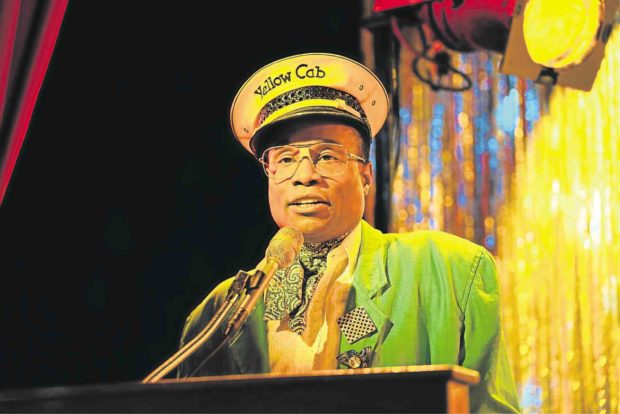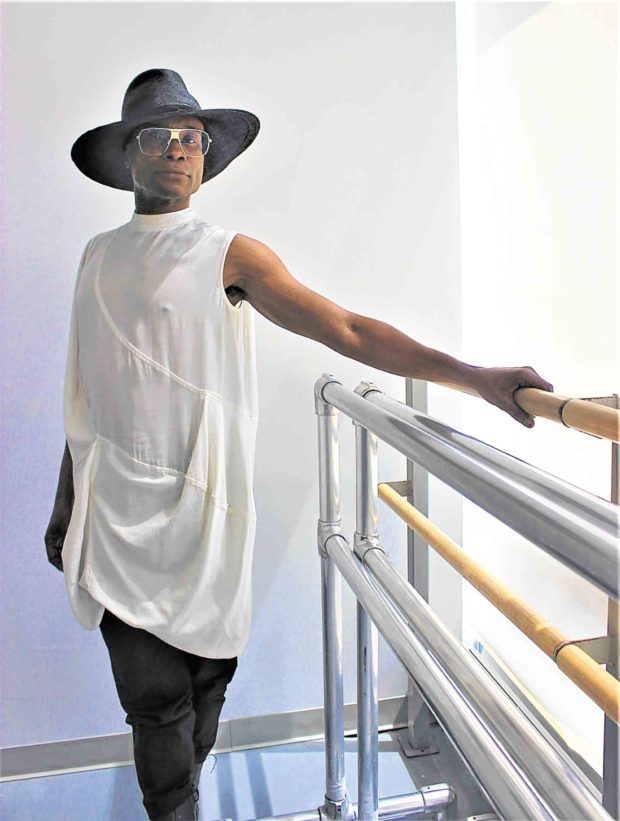Billy Porter: From ‘Miss Saigon’ chorus to ‘Pose’ master of ceremonies
LOS ANGELES—“I remember his mouth (he was always loud), his cherubic face, and that unmistakable voice,” Lea Salonga reminisced about Billy Porter, who was in the chorus of the first “Miss Saigon” production on Broadway.
“He hadn’t even graduated from college yet when he started rehearsals for ‘Miss Saigon,’” Lea added. “Outsized personality, stratospheric talent. So when I see this man doing well and sharing his knowledge and wisdom with others, I feel blessed to be able to call him a colleague and a friend.”
The actor, who originated the role of Lola in “Kinky Boots” on Broadway and won a Tony Award for his performance, is now starring in Ryan Murphy’s “Pose.” He is earning raves as Pray Tell, the emcee in the new FX drama series, which looks at the ball culture world of late 1980s New York, when the Trump-era luxury lifestyle was flaunted.
At the Alvin Ailey Studios in Manhattan, Billy was loud, all right. His voice reverberated in a huge rehearsal room. Wearing a hat and a white top, Billy—outspoken, articulate and passionate—was indeed a “force of nature,” as Ryan Murphy perfectly described his star.
“She’s lovely,” Billy commented in his booming voice about Lea. The actor, who hails from Pittsburgh, Pennsylvania, said he and Lea were “kids” when they worked together in the first New York staging of “Miss Saigon.” When we told him we were going to watch the Philippines’ national treasure in “Once on This Island” (this was in May), Billy, now 48, remarked, “It’s a beautiful production. You’re going to be very happy.”
Billy described his Broadway journey: “I made my debut in 1991 in the original cast of ‘Miss Saigon,’ then I did ‘Five Guys Named Moe,’ ‘Grease,’ ‘Smokey Joe’s Café.’ Then, I took a break.”
Excerpts from our chat:
Can you talk about how you were cast in “Pose”? I was called to audition for the dance teacher. I came out in 1985. I moved to New York City in ’90. I was sort of ball culture-adjacent because I did a lot of Broadway shows. So I spoke up in the audition. I said, “I actually would be better in this other world, you all should think about that (laughs).” And Ryan Murphy came back with this idea of making me the MC, the person who has the history, who has lived it.
Why did you stay away from Broadway for over a decade? I didn’t know it was going to be 13 years when I took it off, but I wasn’t liking the trajectory of where my career was going. I needed to step back from it to figure out how to be a whole person. I was pigeonholed into being a clown in a sense that I didn’t like [the roles I was being offered].
What did you do during those 13 years? I went to graduate school in UCLA in the screenwriting program. I started directing and writing. What brought me back was the revival of “Angels in America” in 2010.
For the first time, when I saw the character of Belize [in “Angels in America”], I said, that’s who I am, that’s the representation I’ve never seen.
So that journey, which started in ’93, ’94, came full circle in 2010 with the actual revival of “Angels in America.”
Why do you think it’s important to show the 1980s era to the new generation? When we don’t know our history, we’re doomed to repeat it. After the 2016 (presidential) election, we have been snatched back into a world that I personally have already lived through and I’m not interested in living through it again. I lived through the AIDS crisis. F**k Trump. We’re not going back.
Are these balls still going on today? Yes, every week. All over the world now. It started in the ’20s with our trans ladies, and it evolved into other things. This show reclaims the fact that it was our trans women who actually were the movement and are still the movement today.
Do you remember your first ball? It was 1995 and I was doing a workshop of “King Lear” at the Public Theater. It was called “House of Lear.” We did a lot of research while we were working on the workshop. So I had an opportunity to dip in.
You were quite young during the AIDS crisis. When you look back at that time, what do you think about? It was so traumatizing. We’re on this other side—those of us who survived. I wrote a play about it called “The Untitled Sex Project.” The people who were supposed to teach us died in a plague.
I’ve gotta do something. I’ve gotta say something. I’ve got to be that representative, because we’re the first generation that was blessed to be alive to do it.
Do you turn to people? How do you do it? Step by step. I thought, how can I be of service to something other than my own ego and bank account in an industry that’s inherently narcissistic?
The answer was loud and clear—to be my true, authentic self.
What was your childhood like? Have you always been this vocal and passionate? I grew up in the Pentecostal Church in Pittsburgh, Pennsylvania. My family was afraid of me because I was a little sissy boy. They were very religious. I listened to people on the pulpit say that AIDS was the punishment for your lifestyle, and that was when my life changed.
I read the Bible, too. That’s not what Jesus says… So, I left the church when I was 16, and I’ve not been back. “Kinky Boots” came to town on tour. I came with it, sold out a 3,000-seat theater in two days.
Is it getting worse out there? It is getting worse and we’re hearing more about it. Well-intentioned liberals; nonpeople of color want it to move on. We had a black president… we thought we won something, and we stopped paying attention.
The mistake that this white supremacist administration made is attacking everybody.
What can we all do to end discrimination in any form? The only thing I can do is show up for my life and keep fighting until the day I die. Eternal vigilance is the price of liberty.
What do you think of the #MeToo movement? It’s an outgrowth of people reminding themselves of their humanity and taking a stand. And going, no, this has gone on for too long and, no, I don’t need that job.
Kevin Spacey put his hand on my ass in the elevator once. I told him to get his hand off or I’d punch him in the face.
E-mail the columnist at rvnepales_5585@yahoo.com. Follow him at https://twitter.com/nepalesruben.

